“Master of Arts in Education (International Education)” launched in April of 2017 to meet the global social demands for education. With the Graduate Education Reform at the university, it was reorganized as “Subprogram in International Education” in April of 2020. This subprogram is one of three specializations offered in the Master’s Program in Education.
News and updates!
| Our admission guidelines for 2022 academic are available at this website. Applications for the 2023 academic year will be accepted in September of 2022. |
 Rationale
Rationale
As part of the government plan to maximize the development of human resources, educational practices in Japan are currently open to change. Much might be learned from current models of international education to inform the changes. But Japan’s unique cultural and educational traditions also have much to contribute to potential new models. Synergizing these two strands is an exciting challenge in which you can take part as a master’s student of international education at the University of Tsukuba. An important component of the course is an in-depth study of IB philosophy, pedagogy, and practices leading to the award of an IB educator certificate for successful participants.
If you are a courageous critical thinker and want to be part of creating meaningful change in educational practices in Japan, then please contact us.
Aims of the specialization
The aim of the University of Tsukuba’s Master’s Program in Education is to develop highly skilled and committed leaders in education who can address issues in the field. The specialization in International Education aims to develop the knowledge, skills, and concepts necessary for successful practice and research in a globalized world.
Objectives of the specialization
The objectives of the specialization are to develop internationally minded inquirers with a sound understanding of innovative thinking in education and the skills necessary to plan and conduct research on issues in international education. Students will investigate pedagogy, curriculum, and assessment in the context of the International Baccalaureate and other international curricula.
Student profile
This specialization welcomes open-minded thinkers with an active interest in educational innovation who want to make a contribution to the field of international education.
Language of instruction
Course offerings in this program will include both courses taught in English and Japanese. Students wishing to pursue the IB Educator Certificates will have the majority of their coursework delivered in English.
Academic year
The University of Tsukuba has two semesters which are divided into three five-week terms (A,B,C). The majority of classes take place in Terms A and B. The academic year begins in April and ends in March.
International Baccalaureate Educator Certificates
The University of Tsukuba is recognized to offer the International Baccalaureate’s (IB) Certificate in Teaching and Learning (IBCTL) and the Advanced Certificate in Teaching and Learning Research (IBACTLR), through its Masters of Arts in Education (International Education) programme.
Tuition
For information on fees, please visit the University of Tsukuba website.
 Scholarships
Scholarships
Government scholarships
The Japanese government (Monbu-kagaku-shō) offers some scholarships for international students. Information on applying for Japanese Government scholarships is available through Embassy websites in your home country. Scholarship for International Students In Japan
Private scholarships and financial support
Once enrolled in the program students can apply for scholarships provided by local governments, organizations and private scholarships. For more information on financial support, please visit the University of Tsukuba’s scholarships page.
Click here to view our brochure.

For more information about the subprogram, please visit Master’s Program in Education website.
Last update: November 16, 2021
